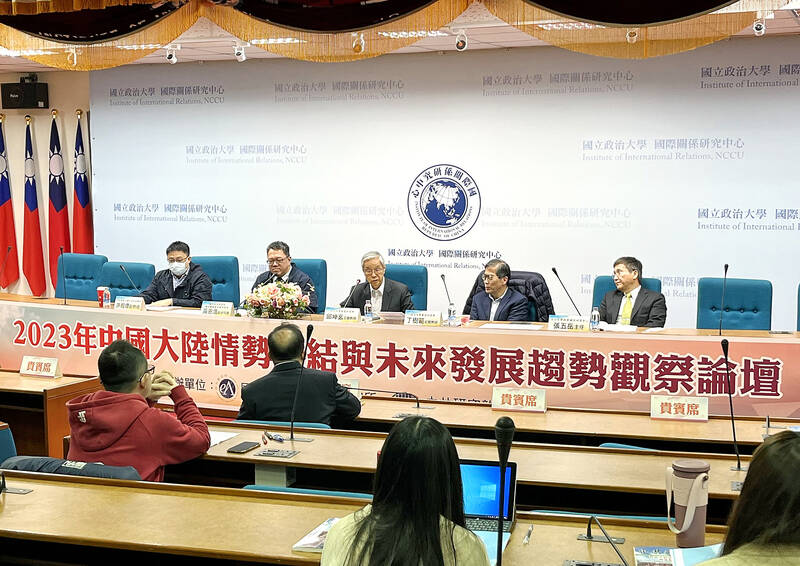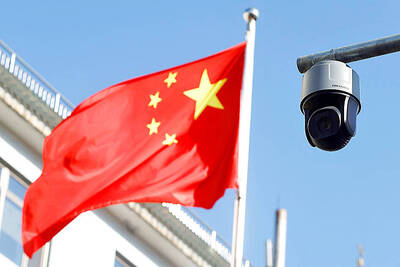China is closely following elections this year in Taiwan and the US, as their outcomes are to influence Beijing’s cross-strait policies, experts said at a forum on Wednesday.
Despite the frequency of military intimidation and economic sanctions by Beijing, it is unlikely to result in an actual crisis in the Taiwan Strait in the near future, since there are pressures and tactics still under “controllable conditions” by the Chinese government, said Chang Wu-yue (張五岳), a professor in the Department of International Diplomacy and Relations at Tamkang University in New Taipei City and head of the Center for Cross-Strait Relations.
Following November last year’s meeting between US President Joe Biden and Chinese President Xi Jinping (習近平) at the APEC forum in San Francisco, China did not reduce its threat and propaganda campaigns targeting Taiwan, Chang said at the forum held at National Chengchi University.

Photo: CNA
“These are political moves aimed to satisfy the Chinese domestic audience, and to inform the outside world on where Beijing’s bottom line is ... as the conditions are still under control by Beijing’s leadership,” Chang said.
Chang listed three key factors for influencing cross-strait relations:
The US and China as making moves in a new game of geopolitics between two major powers, China’s development after its 20th Party Congress in October 2022, and the outcome of tomorrow’s presidential and legislative elections.
“The Chinese Communist Party has already framed Taiwan’s election and its results as Taiwanese choosing between ‘war and peace,’ and ‘economic prosperity and recession,’” he said at a forum on future trends and observations on assessing China’s development.
“The US and China constitute a greater ‘cross-strait relations,’ which place constraints on the ‘smaller cross-strait relations’ between Taiwan and China,” Chang said, adding that China postponed its work meeting on Taiwan affairs to May last year, likely due to rising US-China tensions from the stray weather balloon incident at the time.
Former president Ma Ying-jeou (馬英九) also took a trip to China around that time, amid other occurrences, causing a delay in the working meeting on May 9 and 10 last year, he said.
After the meeting concluded, Chinese Minister of Foreign Affairs Wang Yi (王毅) headed to Geneva, Switzerland, to confer with US National Security Adviser Jake Sullivan, which Chang said is evidence of China’s policies on Taiwan being tied to US-China relations.
“China must first solidify its position in talks with US, and if it has not done so, then it would not be meaningful to deliberate on cross-strait relations,” Chang said.
Beijing started implementing policies last year, based on decisions taken at the 20th Party Congress, to create a “new political situation,” leading to it requesting the WTO to probe trade barriers put up by Taiwan in April last year. Beijing released the investigation results on Dec. 15 last year, he said.
The investigation was followed up with China announcing on Dec. 21 that it would terminate reduced trade tariffs on 12 petrochemical products under the Economic and Cooperative Framework Agreement, which was the first time Beijing used economic sanctions to pressure Taiwan, and an obvious reference to China’s framing of the election as Taiwanese choosing between economic prosperity and recession, he said.
“Taiwan’s election this month and the US elections later this year are two key events that will influence cross-strait relations this year,” Chang said. “No matter which party wins in Taiwan, Beijing would still firmly push along with its long-term aims for Taiwan to come under China’s rule.”
“It is likely that Taiwan’s new president would garner less than a majority of the votes, and would therefore face a stern test of how to lead and rally internal forces in Taiwan to face difficult cross-strait relations challenges,” he added.
In an address by international relations professor Ding Shuh-fan (丁樹範) at the same forum, he said that no matter which party wins the presidential election, “Beijing would still strive for talks on peace and harmony, and to promote unification and bring Taiwan under its rule. This would place more stress and anxiety on pan-green political parties, and lead to a sense of insecurity.”
“But if the Chinese Nationalist Party (KMT) wins this election, then there would be antagonism and strong constraints against a ruling KMT government, which would likely lead to more disunity within Taiwan,” Ding said.
Central Police University professor Yu Chih-wei (游智偉) said in assessing China’s policies on foreign affairs last year that “it is clear that Beijing had no expectations of improvement in US-China relations... Therefore, the upcoming US presidential election and its outcome is also important, as China must face new uncertainties and a new political situation in US.”
The situation in the US is gradually shifting toward the likelihood of former US president Donald Trump regaining the presidency, and if so, then Washington would undergo major adjustments in US global strategies to handle the main geopolitical issues, and would shift in its policies toward China, Yu said.
“China is likely to face a new US-China trade war, with Washington in the past having ramped up much pressure and economic sanctions against China,” he said.

POLAM KOPITIAM CASE: Of the two people still in hospital, one has undergone a liver transplant and is improving, while the other is being evaluated for a liver transplant A fourth person has died from bongkrek acid poisoning linked to the Polam Kopitiam (寶林茶室) restaurant in Taipei’s Far Eastern Sogo Xinyi A13 Department Store, the Ministry of Health and Welfare said yesterday, as two other people remain seriously ill in hospital. The first death was reported on March 24. The man had been 39 years old and had eaten at the restaurant on March 22. As more cases of suspected food poisoning involving people who had eaten at the restaurant were reported by hospitals on March 26, the ministry and the Taipei Department of Health launched an investigation. The Food and

The long-awaited Taichung aquarium is expected to open next year after more than a decade of development. The building in Cingshui District (清水) is to feature a large ocean aquarium on the first floor, coral display area on the second floor, a jellyfish tank and Dajia River (大甲溪) basin display on the third, a river estuary display and restaurant on the fourth, and a cafe and garden on the fifth. As it is near Wuci Fishing Port (梧棲漁港), many are expecting the opening of the aquarium to bring more tourism to the harbor. Speaking at the city council on Monday, Taichung City Councilor

A fourth person has died in a food poisoning outbreak linked to the Xinyi (信義) branch of Malaysian restaurant chain Polam Kopitiam (寶林茶室) in Taipei, Deputy Minister of Health and Welfare Victor Wang (王必勝) said on Monday. It was the second fatality in three days, after another was announced on Saturday. The 40-year-old woman experienced multiple organ failure in the early hours on Monday, and the family decided not to undergo emergency resuscitation, Wang said. She initially showed signs of improvement after seeking medical treatment for nausea, vomiting and diarrhea, but her condition worsened due to an infection, he said. Two others who

Taiwanese should be mindful when visiting China, as Beijing in July is likely to tighten the implementation of policies on national security following the introduction of two regulations, a researcher said on Saturday. China on Friday unveiled the regulations governing the law enforcement and judicial activities of national security agencies. They would help crack down on “illegal” and “criminal” activities that Beijing considers to be endangering national security, according to reports by China’s state media. The definition of what constitutes a national security threat in China is vague, Taiwan Thinktank researcher Wu Se-chih (吳瑟致) said. The two procedural regulations are to provide Chinese